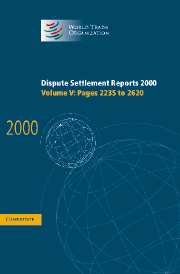Book contents
- Frontmatter
- Contents
- European Communities - Regime for the Importation, Sale and Distribution of Bananas (WT/DS27) Decision by the Arbitrators under Article 22.6 DSU
- Canada - Patent Protection of Pharmaceutical Products (WT/DS114) Report of the Panel
- Chile - Taxes on Alcoholic Beverages (WT/DS87/15, WT/DS110) Award of the Arbitrator under Article 21.3(c) of the DSU
- United States - Imposition of Countervailing Duties on Certain Hot-Rolled Lead and Bismuth Carbon Steel Products Originating in the United Kingdom (WT/DS138) Report of the Appellate Body
Chile - Taxes on Alcoholic Beverages (WT/DS87/15, WT/DS110) Award of the Arbitrator under Article 21.3(c) of the DSU
Published online by Cambridge University Press: 22 December 2017
- Frontmatter
- Contents
- European Communities - Regime for the Importation, Sale and Distribution of Bananas (WT/DS27) Decision by the Arbitrators under Article 22.6 DSU
- Canada - Patent Protection of Pharmaceutical Products (WT/DS114) Report of the Panel
- Chile - Taxes on Alcoholic Beverages (WT/DS87/15, WT/DS110) Award of the Arbitrator under Article 21.3(c) of the DSU
- United States - Imposition of Countervailing Duties on Certain Hot-Rolled Lead and Bismuth Carbon Steel Products Originating in the United Kingdom (WT/DS138) Report of the Appellate Body
Summary
REFERENCE TO ARBITRATION
On 12 January 2000, the Dispute Settlement Body (the “DSB”) adopted the Appellate Body Report and the Panel Report, as modified by the Appellate Body Report, in Chile - Taxes on Alcoholic Beverages (“Chile - Alcoholic Beverages”). On 1 February 2000, Chile informed the DSB, pursuant to Article 21.3 of the Understanding on Rules and Procedures Governing the Settlement of Disputes (the “DSU”), that it would implement the recommendations and rulings of the DSB in this dispute but that it would require a “reasonable period of time” to do so, as provided for in Article 21.3 of the DSU.
Consultations between Chile and the European Communities regarding the duration of the reasonable period of time for implementation took place in Geneva, on 22 February 2000, and subsequently by telephone-conference, but these consultations did not produce agreement.
By joint letter of 27 March 2000, Chile and the European Communities notified the DSB that they had agreed that the duration of the reasonable period of time for implementation should be determined through binding arbitration, under the terms of Article 21.3(c) of the DSU, and that I should act as Arbitrator. The parties also indicated in that letter that they had agreed to extend the timeperiod for the arbitration process, fixed at 90 days by Article 21.3(c) of the DSU, by a further 51 days, that is until 31 May 2000. Notwithstanding this extension of the time-period for the arbitration process, the parties stated that the arbitration award would be deemed to be an award made under Article 21.3(c) of the DSU. My acceptance of this designation to act as Arbitrator was conveyed to the parties by letter of 28 March 2000.
Written submissions were received from Chile and the European Communities on 10 April 2000 and an oral hearing was held on 25 April 2000.
ARGUMENTS OF THE PARTIES
Chile
Chile begins its submission by noting that, under the Constitución Política de la República de Chile (“Constitution”), tax related matters must be regulated by formal laws (leyes) adopted by Chile's National Congress. The Constitution also upholds the “principle of tax legality” which requires “the equal distribution of taxes, in proportion with individual income or in the progressive manner established by law.”
- Type
- Chapter
- Information
- Dispute Settlement Reports 2000 , pp. 2583 - 2594Publisher: Cambridge University PressPrint publication year: 2002



